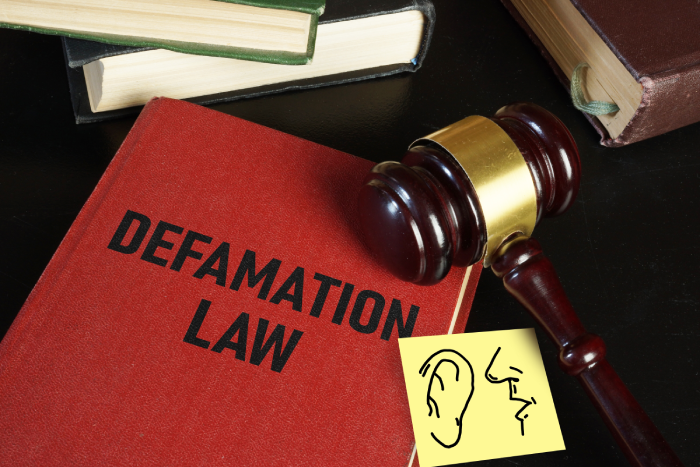Recently, we blogged about the Maryland law on defamation. We now want to turn to the subject of what is defamation. Defamation, for the purposes of this blog post, should be considered the same as libel or slander. So, what is defamation under Maryland law and when does an employer defame an employee when make a false statement in response to a reference check? Believe it or not, a false statement does not mean that there has been defamation under Maryland law. To sustain a defamation claim, Maryland law requires a showing that: “(1) the defendant made a defamatory communication to a third person; (2) that the statement was false; (3) that the defendant was at fault in communicating the statement; and (4) that the plaintiff suffered harm.” Samuels v. Tschechtelin, 763 A.2d 209, 241-42 (Md. Ct. Spec. App. 2000). However, in the context of references, although “fault” is generally determined under a negligence standard, where a defendant “publishes a statement in furtherance of his own legitimate interests, or those shared in common with the recipient or third parties, or where his declaration would be of interest to the public in general,” a conditional privilege applies. Klingshirn v. Fid. & Guar. Life Ins. Co., No. RDB-12-00542, 2013 U.S. Dist. LEXIS 119868, at *13 (D. Md. Aug.22, 2013); see also Bagwell v. Peninsula Regional Med. Ctr., 665 A.2d 297, 317 (Md. Ct. Spec. App.1995) (employer’s character reference statements about former employee to prospective employer subject to qualified privilege). If the privilege applies, an employee must show that the mailice acted with malice to overcome it. Bagwell, 665 A.2d at 318; Gohari v. Darvish, 767 A.2d 321, 328 (Md. 2001) (to overcome conditional privilege, plaintiff must show that (1) the publication [was] made with malice, that is, with knowledge of falsity or reckless disregard for the truth; (2) the statement was not made in furtherance of the interest for which the privilege exists; (3) the statement is made to a third person other than one whose hearing is reasonably believed to be necessary or useful to the protection of the interest; and (4) the statement includes defamatory matter not reasonably believed to be in line with the purpose for which the privilege was granted). “[I]n the context of the employer-employee relationship, statements made to prospective employers or upon request by industry regulatory authorities fall under a qualified privilege if the employer was acting in good faith. In that context, there is a legal presumption that the employer is acting in good faith absent a showing by ‘clear and convincing evidence’ that the employer acted with actual malice or intentionally or recklessly disclosed false information about the employee.” Hermina v. Safeway, Inc., No. WMN-11-1523, 2012 WL 12759, at *6 (D. Md. Jan. 3, 2012). Examples of where employees have successfully plead defamation claims against employers for false statements in response reference inquires, include:
- an employer stating that an employee refused to take a drug test, Ziemkiewiewicz v. R+L Carriers, Inc., when employer may have made no effort to determine if the statement was true or not;
- an employer stating that an employee was “not a good organizer” because the comment could be understood as implying that the employee failed to perform job duties, Murray v. United Food & & Commercial Workers Int’l Union, 289 F.3d 297, 305-06 (4th Cir. 2002) (applying Maryland law);
- an employer stating that an employee was dismissed for performance reasons actionable in a defamation suit. Samuels v. Tschechtelin, 763 A.2d 209, 242 (Md. Ct. Spec. App. 2000);
However, just because an employee can state a defamation claim does mean that the employee will ultimately win. Here, is when the qualified privilege comes into play - when an employer can get away with making false statements and not being held liable for defamation. For example, an employee lost on his claim that his employer defamed him by falsely telling prospective employer that he was discharged for theft because there was no evidence the employer statement was made maliciously, recklessly or intentionally, Frank v. Home Depot, 481 F. Supp. 2d 439 (D. Md. 2007). In short, the employee failed to overcome the qualified privilege under Maryland law To overcome the qualified privilege, the employee must prove that the employer made the statement with actual or express malice, which mean that the employer had knowledge of the falsity of the statement or acted in reckless disregard of the truth. To act in reckless disregard of the truth means something more than mere negligence. There a few Maryland cases where employees have successfully met this burden. One is Lewis v. Forest Pharmaceuticals, Inc., 217 F. Supp. 2d 638 (Md. 200, where an employee overcome the qualified privilege by showing that her former supervisor made a false statement about her performance only because she rejected his sexual advances. To pursue a defamation claim against an employer, it is important that at the employee have sufficient facts to prevail on the claim. Doing a thorough pre-lawsuit investigation with competent experienced counsel is a must. Contact Maryland's best lawyer, Lebau & Neuworth, today.











